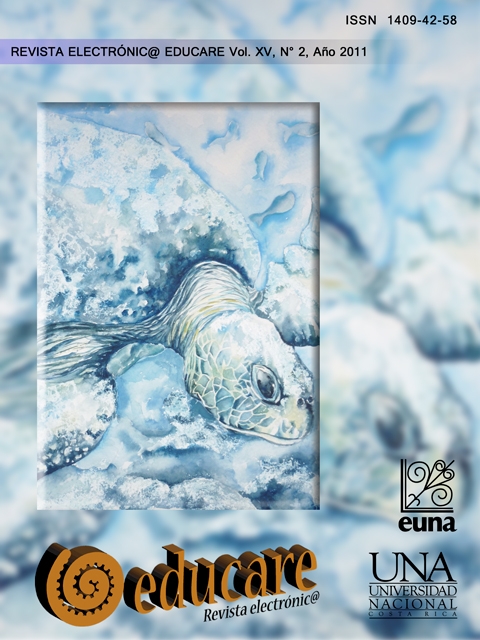Social Development and Higher Education
DOI:
https://doi.org/10.15359/ree.15-2.5Keywords:
Society, Meaningful Learning, Education, Teaching PracticeAbstract
This essay has as its main objective to reflect on the duty of the Costa Rican public university and its responsibility to educate in order to foster social development, which is understood as one of the multiple challenges that the higher education faces due to the demands imposed on the operation of knowledge in the present and the relation of such demands with independent knowledge development. In addition, a defense is made of some issues that have been approached weakly in previous studies, issues that become part of the essential elements for promoting a meaningful and functional education that has social impact, elements such as the following: a) Ethics in the organization, b) The university’s self-education, c) The effect of curricular policies on the practices being promoted, d) The transformation of the teaching culture to improve practice, and e) The construction of knowledge on which to base criteria, decision making, problem solving and the development of life projects.
References
Freire, P. (2002). Pedagogía de la autonomía. Buenos Aires: Siglo XXI Editores.
Gimeno, J. y Pérez, A. I. (1992). Comprender y transformar la enseñanza. Madrid: Morata.
Oliva, F. y Henson, K. T. (1989). ¿Cuáles son las competencias genéricas esenciales de la enseñanza?
En J. Gimeno y A. Pérez (eds.). La enseñanza: Su teoría y su práctica (pp. 356-363). España:
Ediciones Akal.
Perrenoud, P. (2004). Diez nuevas competencias para enseñar. Barcelona: Graó.
Santos, M. A. (2001). La escuela que aprende (2ª ed.). Madrid: Morata.
Stenhouse, L. (2004). La investigación como base de la enseñanza (5ª ed.). Madrid: Ediciones
Morata.
Tedesco, J. C. (1999). El nuevo pacto educativo (3ra ed). España: Anaya.
Torres, J. (2005). El curriculum oculto (8a
ed). Madrid: Morata.
Torres, J. (2006). Globalización e interdisciplinariedad: el curriculum integrado (4ª ed.). Madrid:
Morata.
Zabala, A. (1999). Función social de la enseñanza y enfoque globalizador (Cap. 2). En A. Zabala
(aut.). Enfoque y pensamiento complejo. Una respuesta para la comprensión e intervención
en la realidad (pp. 35-66). Barcelona: Graó.
Downloads
Published
How to Cite
Issue
Section
License
1. In case the submitted paper is accepted for publication, the author(s) FREELY, COSTLESS, EXCLUSIVELY AND FOR AN INDEFINITE TERM transfer copyrights and patrimonial rights to Universidad Nacional (UNA, Costa Rica). For more details check the Originality Statement and Copyright Transfer Agreement
2. REUTILIZATION RIGHTS: UNA authorizes authors to use, for any purpose (among them selfarchiving or autoarchiving) and to publish in the Internet in any electronic site, the paper´'s final version, both approved and published (post print), as long as it is done with a non commercial purpose, does not generate derivates without previous consentment and recognizes both publisher's name and authorship.
3. The submission and possible publication of the paper in the Educare Electronic Journal is ruled by the Journal’s editorial policies, the institutional rules of Universidad Nacional and the laws of the Republic of Costa Rica. Additionally, any possible difference of opinion or future dispute shall be settled in accordance with the mechanisms of Alternative Dispute Resolution and the Costa Rican Jurisdiction.
4. In all cases, it is understood that the opinions issued are those of the authors and do not necessarily reflect the position and opinion of Educare, CIDE or Universidad Nacional, Costa Rica. It is also understood that, in the exercise of academic freedom, the authors have carried out a rogorous scientific-academic process of research, reflection and argumentation thar lays within the thematic scope of interest of the Journal.
5. The papers published by Educare Electronic Journal use a Creative Commons License:















 The articles published by Educare Electronic Journal can be shared with a Creative Commons License:
The articles published by Educare Electronic Journal can be shared with a Creative Commons License: 



